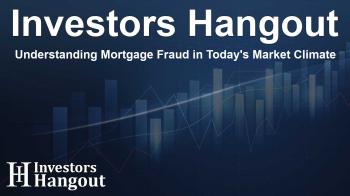Understanding Mortgage Fraud in Today's Market Climate

Mortgage Fraud: An Overview
Mortgage fraud has emerged as a topic of increasing concern, particularly as high-profile individuals find themselves entangled in allegations surrounding such activities. The ongoing discourse involves notable figures, including several critics of former President Donald Trump, indicating the serious nature of these accusations.
High-Profile Allegations
Among those involved are Federal Reserve Governor Lisa Cook, New York State Attorney General Letitia James, and California Senator Adam Schiff. Trump has made accusations against them, suggesting that they are involved in mortgage fraud. On the other hand, Texas Attorney General Ken Paxton faces his own allegations regarding mortgages that allegedly contained misleading statements.
Trump's Real Estate Scrutiny
Trump himself is no stranger to scrutiny related to real estate and mortgage practices. A New York judge ruled in 2023 that he had inflated property values to secure favorable loan terms. This ruling came after the closure of Trump Mortgage LLC, a venture that started in 2006 and faced significant challenges, including lawsuits, leading to its demise within a year.
Understanding Mortgage Fraud
With the rise in home prices and interest rates making home buying more challenging, a closer look at what constitutes mortgage fraud is warranted. Mortgage fraud can take many forms, often aimed at obtaining loans or financial advantages illegitimately.
Current Trends in Mortgage Fraud
According to recent data from Cotality, various categories of mortgage fraud have seen fluctuations. In the second quarter of 2025, increases were noted in several forms of fraud, including undisclosed real estate debt and transaction fraud risk, highlighting a concerning trend as home values rise.
Common Patterns in Mortgage Fraud
Mortgage fraud typically manifests through several methods:
- **Inflating income or assets**: Borrowers may exaggerate earnings, savings, or property values.
- **Falsifying documents**: This includes creating fake pay stubs or tax returns to mislead lenders.
- **Misrepresenting property values**: Sellers might overstate a home's worth to help buyers secure larger loans.
- **Straw buyers and identity theft**: Fraudulent loans may involve the use of another person's identity without intent to repay.
The Consequences of Mortgage Fraud
The fallout from mortgage fraud can be severe for all parties involved. Victims may face loan denials, foreclosure, or significant financial losses, while perpetrators can incur hefty fines, legal repercussions, and potential prison time. Additionally, widespread fraud can distort property values and erode lender trust.
The Housing Crisis Context
The current housing market is marked by a crisis with insufficient new home construction in high-demand areas. This situation is exacerbated by factors such as rising costs due to tariffs on building materials, which ultimately increase home prices.
The Impact of Stagnant Wages
Stagnant wage growth has also contributed to strained affordability, as household incomes have not matched the escalating costs of housing. For families, mortgage payments now average nearly $1,000 more per month compared to pre-pandemic times, which makes homeownership a distant dream for many.
Market Reactions and Future Outlook
The response from the market has not been encouraging, with Real Estate ETFs experiencing notable underperformance. Prominent investors, including hedge fund manager Ray Dalio, have expressed concerns regarding investing in real estate in the current environment.
Real Estate Investment Options
Investors eyeing the real estate sector should also consider sector-specific ETFs such as the Dimensional Global Real Estate ETF (DFGR), Federal Home Loan Mortgage Corp (FMCC), and others that may provide exposure to real estate trends despite recent market instability.
Conclusion: Implications for Investors
As mortgage fraud persists as a point of contention, investors and homebuyers alike must navigate these treacherous waters, balancing opportunities with the risks inherent in an ever-changing housing market landscape. The future may hold significant implications for those tied to real estate investments.
Frequently Asked Questions
What is mortgage fraud?
Mortgage fraud refers to various illegal practices where individuals misrepresent information to obtain a loan or avoid loan repudiation.
How common is mortgage fraud?
Mortgage fraud rates have been increasing, particularly during times of rising property costs and economic uncertainty.
What are some common methods of committing mortgage fraud?
Common methods include inflating income or property values, falsifying documents, and identity theft.
What are the legal consequences of mortgage fraud?
Legal consequences may range from heavy fines and credit damage to substantial prison sentences depending on the severity of the crime.
What impact does mortgage fraud have on the housing market?
Mortgage fraud can distort property values, lead to decreased lender confidence, and negatively affect market stability overall.
About The Author
Contact Addison Perry privately here. Or send an email with ATTN: Addison Perry as the subject to contact@investorshangout.com.
About Investors Hangout
Investors Hangout is a leading online stock forum for financial discussion and learning, offering a wide range of free tools and resources. It draws in traders of all levels, who exchange market knowledge, investigate trading tactics, and keep an eye on industry developments in real time. Featuring financial articles, stock message boards, quotes, charts, company profiles, and live news updates. Through cooperative learning and a wealth of informational resources, it helps users from novices creating their first portfolios to experts honing their techniques. Join Investors Hangout today: https://investorshangout.com/
The content of this article is based on factual, publicly available information and does not represent legal, financial, or investment advice. Investors Hangout does not offer financial advice, and the author is not a licensed financial advisor. Consult a qualified advisor before making any financial or investment decisions based on this article. This article should not be considered advice to purchase, sell, or hold any securities or other investments. If any of the material provided here is inaccurate, please contact us for corrections.

